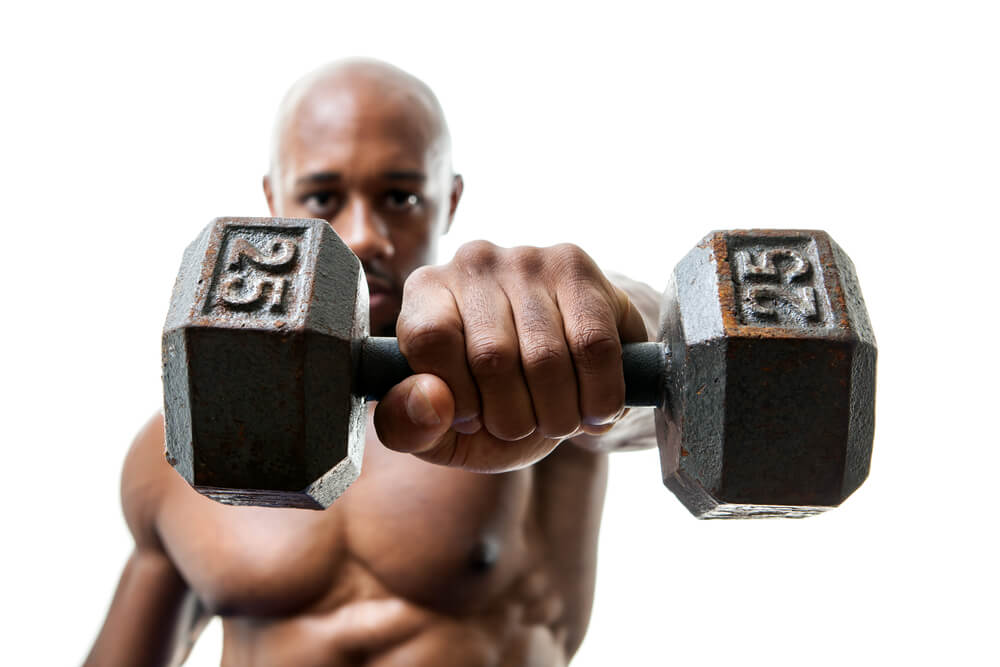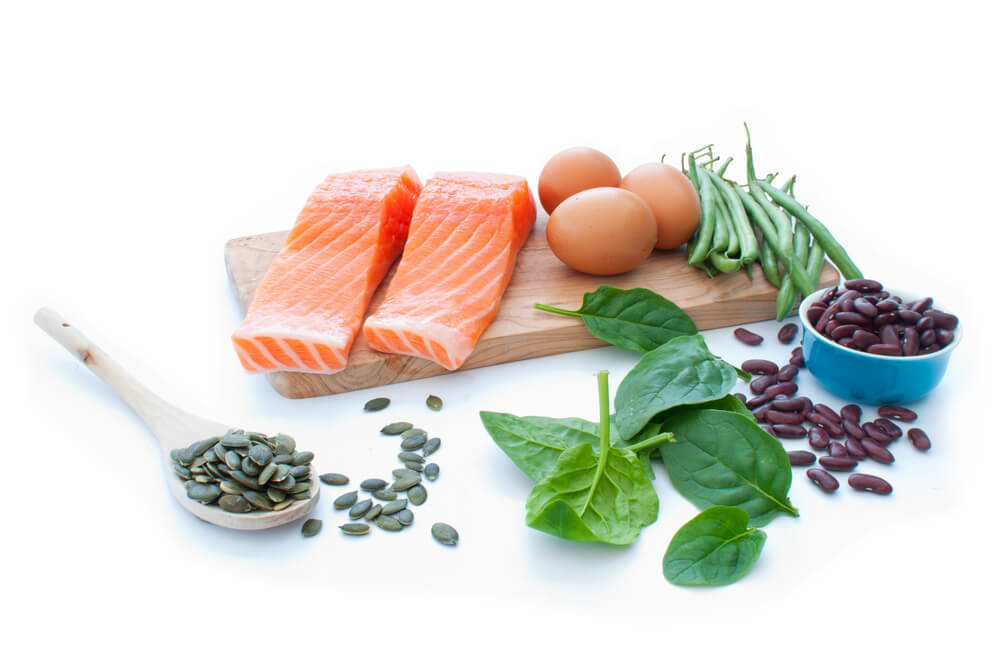
Not seeing enough gains? Not sure why? You may be making some mistakes that are stopping you from building lean muscle. Check this list out to see if you’re hurting your muscle-building chances.
Do your daily habits contribute toward the growth and maintenance of lean, healthy muscles?
Or, are you sabotaging your hard work at the gym by slipping up on the finer details?
Establishing a solid workout routine is only half the battle when it comes to building a ripped physique.
To build and keep strong muscle, you have to take into account many other factors that can have a major impact on the effectiveness of strength training. This list will point out where you are potentially going wrong when it comes to feeding and caring for your muscles.
8 Things Stopping You From Building Lean Muscle

#1 You Are Not Drinking Enough Water
Water is essential to life. It is the medium in which most metabolic processes are carried out. Water is vital not only for keeping an athlete sharp and focused but also for ensuring optimal muscle performance.
Understand how to tell if your dehydrated, and you will be fine.
Dehydration of 3% causes a 10% loss of strength. This is enough to significantly affect your training capacity.
Conversely, consuming the right amount of H2O positively boosts performance by up to 25%. Water helps your body to stay efficient by carrying nutrients to cells and transporting waste out of your body. It also helps to form structures like glycogen and protein, both of which are essential sources of fuel for athletes.
A dehydrated body is also deprived of electrolytes. These serve to stimulate nerves and contract muscles. Depriving your body of water depletes the aqueous environment in which these vital electrolytes are dissolved, limiting muscle control and strength. To maintain hydration, make sure to drink 0.5 to one ounce of water per pound of body weight per day.

#2 You Do Not Warm Up
Just as important as the actual workout itself are the warm-up and cool-down portions of an exercise regime. Five to 10 minutes before training, take the time to prep your muscles for the coming exercises by doing movements such as planks or jumping jacks.
Here are some workout warm up ideas.
These preliminary exercises will increase circulation to muscles, tendons and ligaments. This increased circulation saturates muscles and connective tissues, making them more elastic, which guarantees enhanced performance and lessens the chance of injury.
In addition to increasing the flow of blood to specific body parts, warm-up exercises boost your core body temperature. This allows muscles to stretch optimally. Warming up before beginning your strength training exercises will also help to secure less muscle soreness post-workout, ensuring that you will be able to get up and do it all again the next day.

#3 You Ignore Your Core
What good are all those arms, back, and leg workouts if you are not building from a strong foundation?
That is precisely what your core should be—a solid base from which your limbs can perform powerful movements. A weak core will leave you with poor posture, higher chance for muscle injuries and lower back pain.
Core workouts do not just flatten your tummy and give you ripped abs, but also work on the deeper abdominal muscles, called the transverse abdominals. These muscles not only cinch in your waist but also help to support your spine. Doing core workout routines exercises makes the muscles of your back, abdomen and pelvis work in harmony, making your entire body stronger and increasing your balance and stability.
Many workout regimens and different sports require high levels of stability and bodily control. That is where working out your core comes into play. Core workouts—such as air bicycling, planks and bridges—will also help to increase your body’s weight-bearing capabilities, making back and arm workouts that utilize heavy weight more effective.

#4 You Do Not Get Enough Protein
It’s simple: Athletes who get ample protein throughout the day build and maintain lean muscle mass better than those who do not.
What does enough protein look like?
People who train regularly typically need one gram of protein per pound of body weight per day.
The body needs protein for building muscles. In fact, it needs complete protein every three to four hours to provide enough amino acids for building muscle.
Not consuming the required combo of the nine amino acids will hinder your body from making new muscles.
Fat and carbs are the body’s preferred fuel sources and are turned into triglycerides and glucose, respectively, by the body’s metabolic processes. After all the fat and carbs have been used up, protein is next in line as a fuel source. And if you don’t love the taste you can always research the
And if you don’t love the taste you can always research the best tasting protein powder.
As a last resort, if the sufficient dietary protein is lacking, your body will turn to your muscle tissue as a source of extra energy that it can burn for fuel, causing you to lose muscle mass. Eating enough protein reassures your metabolism that you will in fact, use the muscles you already have for movement and that it does not need to break down your muscles for a quick protein fix. In turn, your body becomes more efficient at burning fat.
Protein also serves to repair muscles.
When you work out, you create tiny tears in your muscle tissue. Your body reacts to this damage by lengthening and expanding muscle fibers with the aid of amino acids, thereby increasing their capacity to store energy so that the next time you exercise your body is prepared to handle the work.

#5 You Do Not Sleep Enough
I bet you thought that muscles were made at the gym. As it turns out, they are also made in the bedroom, and, no, we do not mean that way. Getting enough sleep is vital to restoring the damage done to your muscles during a training session. Don’t spend enough hours snoring into your pillow and you will notice the (lack of) results when you wake up to flex in your bathroom mirror.
Why is it so vital to get your sleep?
Does sleep affect muscle growth? You bet…
Growth hormone and testosterone are both released while you sleep, so not getting enough shut-eye hinders your ability to build muscles and burn fat.
Remember those microscopic tears in your muscles that we mentioned in the last point?
The process of repairing those tears involves protein synthesis, which also occurs while you sleep.
While asleep, your body slips into an anabolic (muscle building) state and uses the time to repair and rejuvenate every tissue you have. Sleep and nutrition are the two things that determine how well your muscles are repaired after a training session, and your body conducts protein metabolism at a higher rate when you are asleep than when you are awake.
Do not get enough sleep, and your body won’t be able to restore the damage done to your muscles during a training session. Getting adequate sleep also lowers stress levels, which ensures lower levels of the hormone cortisol. Cortisol counteracts the effects of testosterone, and can aid in the breakdown of muscle tissue and inhibit muscle growth.
To combat potential protein catabolism (breakdown) during sleep, drink whey protein isolate or casein before bed. Casein is a slow-release protein that is ideal prior to bedtime. Both of these proteins will elevate your amino acid levels while you sleep, giving you an extra muscle-building boost.

#6 You Do Not Refuel Post-Workout
Putting in all that work training your muscles will be for naught if you fail to nourish them after you finish working out. Known in the bodybuilding world as nutrient timing, what you eat before, during and after a workout is important for maximizing results. Whether your intention is to build muscle, lose weight or train for a certain sport, proper nutrient timing will serve to enhance your session.
There is an optimal window for refueling post-workout when you should be taking in carbs and protein. Depending on the type of exercise you are doing, that window can range from 30 minutes to 48 hours, so make sure you do your research and figure out the window for your personal routine. But as a rule, exercise makes muscles sensitive to certain nutrients and hormones, so your muscles are at their most responsive to nutrient intake for 30 minutes after exercising.
High-glycemic carb foods can be consumed right after a workout to replenish glycogen stores, as muscle tissue is sponge-like and rapidly absorbs glucose for speedy recovery. Particularly after resistance training, athletes should consume high-protein foods to repair and rebuild muscle. Grilled salmon with rice, peanut butter, and jelly sandwiches, and turkey chili with whole wheat toast are all optimal post-workout meals to replenish nutrients, restore electrolyte balance, rehydrate, subdue inflammation and restore damaged muscle tissue.

#7 You Are Doing Too Much Cardio
Can you really get too much of a good thing?
Yes. With that in mind, can there be such a thing as too much cardio?
You’ll want to consider Cardio After Lifting or Before?
The answer turns out to be yes, particularly if your goal is to build and maintain strong muscles.
If you do too much cardio, you burn more calories than you eat. In response, your body will first turn to any fat on it for fuel. Right after that it will turn to your muscles. Doing too much cardio puts your body into a catabolic state and burns through all your hard-earned muscle. Loss of muscle results in reduced strength, as well as a slower metabolism.
This will make it harder to burn fat.
A lot of people think that to lose fat and gain lean, strong muscle, you have to starve yourself and run until you pass out. But the truth is that strength-training exercises increase your body’s capacity for burning fat so that your daily movements will contribute toward you losing weight as your body becomes more and more efficient. More than 20 to 30 minutes of cardio, two or three times a week will prevent you from gaining mass, so keep your cardio to this minimum amount.

#8 You Are In An Exercise Rut
One of the worst things you can do for your muscles is to have a stagnant workout routine. Working out the same muscles, in the same way, day in and day out, can not only lead to muscle overuse and injury but can also be counterproductive.
Alternating your routine from heavy to light exercises throughout the week will help to keep you toned, and will continue to challenge your muscles and strengthen them without injury. Muscles have their own agenda and are always plotting to guess your next move and prepare for it. The more you do a certain movement, the easier and less effective it becomes.
With each identical workout, you are progressively burning fewer calories and building less muscle. This is why you need to switch it up. Change your workout routine every four to six weeks for maximum results, remembering the acronym F.I.T.T (frequency, intensity, time and type). One example of this is performing more reps or sets using the same amount you usually use in the weight room. Focus on mixing up these variables to maximize your fitness results.
Conclusion
Your muscles are what lend support to your skeletal system, protect from damage to your organs and assist in daily movements, as well as in your exercise routine. Do not beat up your muscles and then neglect to nurture them and expect optimal results.
Your muscles go through cycles of damage and repair, and constantly require nourishment, rest and hydration to perform optimally. Get enough protein, refuel after you work out and don’t neglect your warm-up. If you can do these things and avoid stopping you from building lean muscle, you can watch your muscles grow. Your muscles do a lot of work for you, so show them some respect and take care of them, as they take care of you.
By Lillian Dumont
Latest posts by Terry M (see all)
- Garage Gyms - Aug 1, 2018
- Kettlebells – Why They Should Be Added To Your Routine. - Jul 24, 2018
- Weight Belts: What Are They Really For? - May 31, 2018









